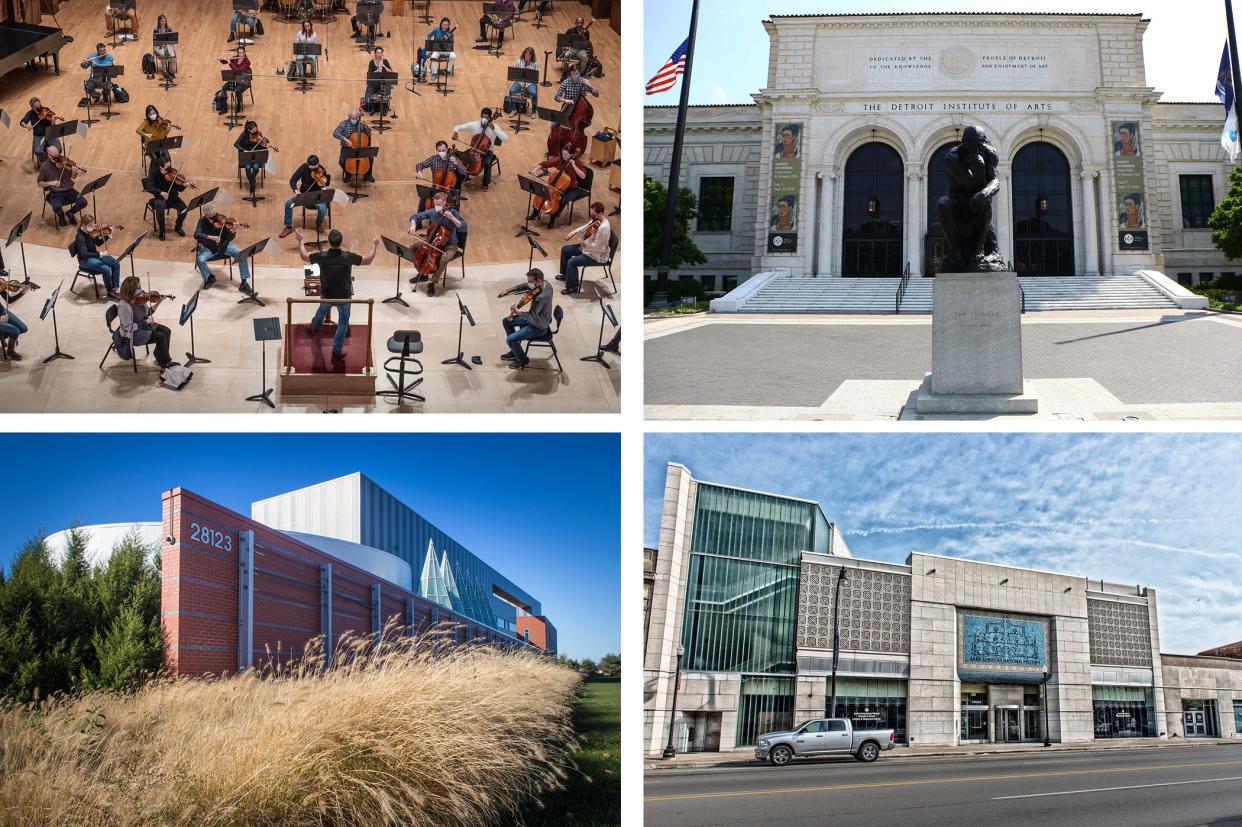Metro Detroit arts groups to share $100 million gift from Ralph C. Wilson Jr. Foundation

- Oops!Something went wrong.Please try again later.
A windfall of cash is making Detroit’s arts and culture scene a lot richer.
The Ralph C. Wilson Jr. Foundation has announced a multiyear, $100 million commitment to 11 arts organizations in Detroit and the surrounding suburbs, creating a large endowment that will generate operating money for decades to come.
The list includes cultural name brands like the Detroit Symphony Orchestra and the Detroit Institute of Arts as well as small museums like the Arab American National Museum in Dearborn and the Holocaust Memorial Center in Farmington Hills.

There’s also cash set aside for a one-time capital grant of $5 million to the Motown Museum for the ongoing expansion of its campus. For the museum, the gift is another notable step in its ongoing $55 million expansion campaign. Its fundraising total now stands at $37 million, and work is underway on the second of three construction phases at the Hitsville, U.S.A., complex.
In addition, the foundation is creating an annual $500,000 grant program that will award money to small and midsize arts and culture nonprofits.
Another Rust Belt city looking to reinvent itself, Buffalo, New York, will see the same $100 million investment in its arts scene, bringing the total Ralph C. Wilson Jr. Foundation outlay to a whopping $200 million. The huge cash gifts are the latest but not the first investment benefiting both cities from the $1.2 billion endowment of the late Ralph Wilson, the namesake of the foundation, who died in 2014.
More: Michigan Opera Theatre receives $5-million grant, largest donation in its history
More: Kresge Foundation among first annual City of Detroit arts and culture honorees
Wilson grew up in Detroit, graduated from the University of Michigan Law School and was a longtime resident of Grosse Pointe Shores. As the founder and longtime owner of the Buffalo Bills, he had deep ties to Buffalo, too.
In 2018, the foundation donated $200 million to create new parks and recreational trails in Detroit and Buffalo. The biggest piece of the Detroit gift was $50 million donated to the Detroit Riverfront Conservancy to build a 22-acre west riverfront park. The park is scheduled to open in 2023.
Investment in the arts is a new direction for the foundation, which primarily focuses on “active lifestyles, caregivers and entrepreneurship and economic development,” according to a news release.
David Egner, the foundation's president and CEO, said the arts philanthropy is the result of “seeing cultural institutions as economic drivers.” The financial difficulties that arts institutions encountered as a result of the the pandemic played a factor, he said.
“Who wants to live in a community without arts and culture? We can’t keep the talent in town or attract new talent that will make the economy run if we don’t keep these cultural institutions healthy and part of the fabric of our community,” Egner said.
In Michigan, arts, cultural production and the jobs that support those sectors make up about 2.9% of the state’s economy, according to numbers from the U.S. Bureau of Economic Analysis. The arts generate more than 122,000 jobs and $15 billion of economic activity.
Picking the 11 institutions that will benefit from foundation money wasn’t easy, said Egner, who used benchmarks like “attendance, budget and staffing” to help guide the decision-making process.
“There was no easy metric because they represent so many different audiences and communities,” he said. “We did our best to pick our institutions that were drivers and would continue to be economic drivers.”
Some of the $100 million in funding will be made available starting next year, but the main goal is to help fund operating costs for the chosen museums for the duration of their existence.
The foundation will invest $58.75 million over 10 years to create an endowment with the Community Foundation of Southeastern Michigan, which will oversee and administer the funds. Once fully funded, the foundation estimates that the endowment will generate $3.75 million annually.
Most of that amount — $3 million — will be distributed among the 11 arts institutions to help cover operating costs, which could mean anything from staffing to improving accessibility for patrons with disabilities to educational initiatives like field trips for students.
The sum also includes a $500,000 fund that will be announced later in 2022. It will provide grants to smaller and midsize nonprofits in the seven counties that make up southeast Michigan. The rest of the planned annual spending will be used to cover administrative costs of distributing and organizing the commitment itself.
The chosen institutions won’t have to wait a decade for the endowment to mature to start cashing in. Starting next year and continuing for nine years, the Ralph C. Wilson Jr. Foundation will provide that $3.75 million annually. That’s about $33.75 of its overall $100 million commitment.
The Detroit Symphony Orchestra ($700,000) and the Detroit Institute of Arts ($700,000) are receiving the largest annual gifts from the foundation.
Salvador Salort-Pons, the DIA's director, says the funding will help support educational efforts at the museum, such as the field trips the museum provided for about 90,000 students in 2019, as well as efforts to offer more digital experiences for patrons.
“The pandemic has taught all of us about connecting virtually,” said Salort-Pons. “Deepening our work in that realm is important.”
The Motown Museum will receive $200,000 annually in addition to the one-time $5 million grant, which is the largest single donation the museum has received since it announced its expansion in 2016.
The list of recipients also includes stalwarts of the city’s cultural corridor like the Charles H. Wright Museum of African-American History, which will receive $300,000 annually. The Detroit Historical Society, which operates the Detroit Historical Museum, will receive $200,000 yearly, as will the Michigan Science Center and Michigan Opera Theatre.
Two anchors of Dearborn’s cultural landscape made the list. The Arab American National Museum will receive $100,000 annually, and the Henry Ford will receive $150,000.
“Unrestricted giving like this ensures the ongoing growth and sustainability for the Henry Ford and other arts and culture institutions, strengthening our community for future generations,” said Henry Ford President and CEO Patricia Mooradian in a statement.
In Royal Oak, the Detroit Zoo will receive $150,000 annually, while the Holocaust Memorial Museum in Farmington Hills will get $100,000.
Rabbi Eli Mayerfeld, CEO of the Holocaust museum, says some of the annual funds will be used to increase accessibility for patrons with disabilities, including better signage for low-vision patrons and upgrades for wheelchair access.
It will also be used to help manage day-to-day maintenance costs, including installing new ventilation and filtration systems. It's often difficult to raise money for those kinds of expenses, he noted.
“In fundraising, it’s much easier for a donor to hear about a specific program or project, to get excited about that and fund it,” said Mayerfeld, who has led the museum since 2016.
“There’s a tremendous amount of foresight here with this gift that's focused on the everyday (needs) of the organizations they’re supporting. They want donors to be thinking about the basic existence of these important institutions.”
Ryan Patrick Hooper is the host of “CultureShift” on WDET-FM (101.9-FM). Detroit Free Press music writer Brian McCollum contributed to this report.
This article originally appeared on Detroit Free Press: Wilson Foundation donates $100 million to metro Detroit arts groups

